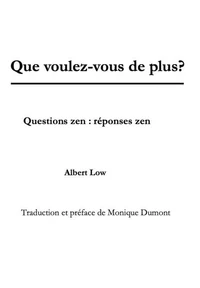Because words can no more hold the truth than a net can hold water, we use koans. Koans are sayings, or doings, of Zen masters, the patriarchs and Buddha. Take for example the koan: The Sound of One Hand clapping. In its entirety it reads: "You know the sound of two hands clapping. What is the sound of one hand clapping?" The obvious, intellectual answer is, No sound at all! But then what is this No sound? In other words, is it just silence?If one is to work on this koan, indeed on any koan, one must demonstrate its meaning.
Explanatory words - such as "the two hands represent duality, the one hand is unity" or "the sound of one hand is the sound of the true self" - are useless. A teacher of Zen would reject them out of hand, all the while demanding a real response. Words talk about true nature and, as it were, hold it at arm's length. One must become the sound of one hand to be able to give a real response, and in this way see for oneself that the sound of one hand is the full expression of the master's and one's own awakened state.
Because words can no more hold the truth than a net can hold water, we use koans. Koans are sayings, or doings, of Zen masters, the patriarchs and Buddha. Take for example the koan: The Sound of One Hand clapping. In its entirety it reads: "You know the sound of two hands clapping. What is the sound of one hand clapping?" The obvious, intellectual answer is, No sound at all! But then what is this No sound? In other words, is it just silence?If one is to work on this koan, indeed on any koan, one must demonstrate its meaning.
Explanatory words - such as "the two hands represent duality, the one hand is unity" or "the sound of one hand is the sound of the true self" - are useless. A teacher of Zen would reject them out of hand, all the while demanding a real response. Words talk about true nature and, as it were, hold it at arm's length. One must become the sound of one hand to be able to give a real response, and in this way see for oneself that the sound of one hand is the full expression of the master's and one's own awakened state.

 , qui est-ce ?
, qui est-ce ?